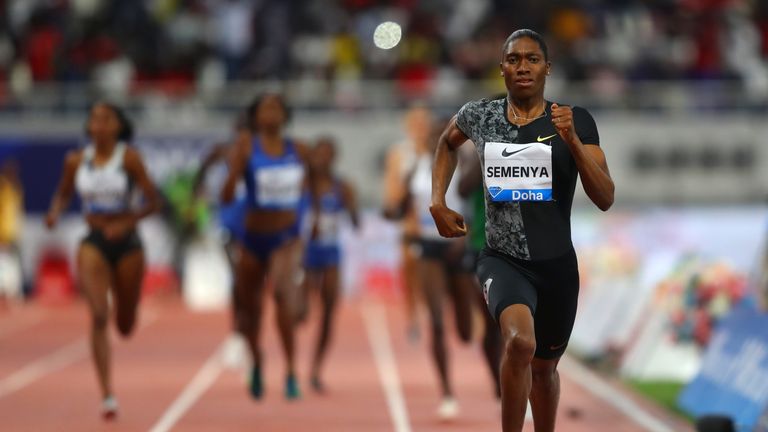IAAF 'seek reversion of superprovisional order' on DSD regulations over Caster Semenya case
Tuesday 4 June 2019 20:58, UK
The IAAF has responded to the Swiss Supreme Court ruling that South African sprinter Caster Semenya will have eligibility regulations against her suspended, saying it will "seek reversion of superprovisional order" over DSD regulations in future.
On Monday, it was confirmed that Caster Semenya will be able to compete without restriction in the female category after the suspension, meaning she can now compete in any 800m race of her choice without lowering her testosterone levels with medication.
Semenya previously said she would "continue to inspire young women and athletes around the world" after her appeal to the Court of Arbitration for Sport was dismissed on May 1.
Currently, IAAF regulations forces athletes with naturally-occurring higher levels of testosterone to take medication to bring them down if they want to continue competing.
Athletics' world governing body said on Tuesday: "The IAAF believes the right to participate in sport does not translate to a right to self-identify into a competition category or an event, or to insist on inclusion in a preferred event, or to win in a particular event, without regard to the legitimate rules of the sport or the criteria for entry.
"It is legitimate for all sport in general, and for the IAAF in particular, to create a protected category for females and to base eligibility for this category on biology and not on gender identity.
"This crucial point was accepted and emphasised by the CAS (Court of Arbitration for Sport) in its April 30 decision to uphold DSD regulations.
"To define the category based on something other than biology would be category defeating and would deter many girls around the world from choosing competitive and elite sport after puberty.
"The IAAF considers that the DSD Regulations are a necessary, reasonable and proportionate means of protecting fair and meaningful competition in elite female athletics, and the CAS agreed.
"The IAAF will seek a swift reversion of the superprovisional order moving forwards so that the DSD Regulations apply to all affected athletes in order (among other things) to avoid serious confusion amongst athletes and event organisers and to protect the integrity of the sport.
"In due course, the IAAF will defend its DSD Regulations and the CAS Award in the appeal proceedings before the SFT."



